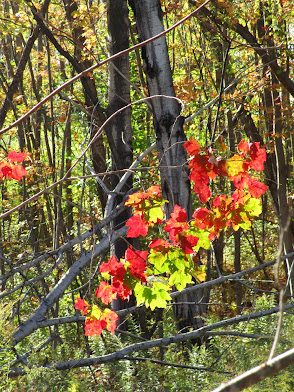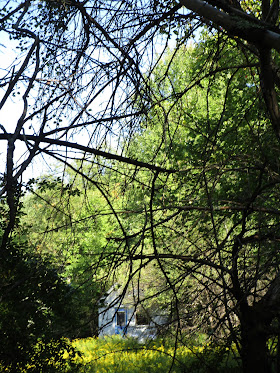So already, this past weekend, my husband Scott and I were back at our cabin located just west of Williamstown over the New York state border. Our task was to winterize it, but we had plenty of time for sitting and looking at the field in front of it. Sitting there, I realized how much I love looking at the vegetation in and around the field through the lower leaf-bare branches of the wild apple trees sprinkled at intervals along the path around it.
I didn't always feel this way. I used to ask Scott periodically why those trees didn't slough off those branches that had apparently been rendered fruitless, leafless, and "dead" by the sunlight's inability to penetrate the canopies of leafy, spreading branches above them. But now, I've grown attached to looking through the lacy scrims formed by their bare, tangled branches. Especially in the fall, to see orange, yellow, and red vegetation through their low-slung dark branches is like having a "burning bush" experience.
But the truth is that the Berkshire-Taconic region abounds in burning bushes in autumn--in splashes of intense color announcing themselves on muted hillsides, along trampled footpaths, among branches hung with dry, brown leaves waiting to fall at the wind's next shudder. And this matters because this is a blog post about seeing or hearing--or not--what's there, especially what's probably been there all along--which almost always is more about the person than about the thing they* are perceiving or not perceiving.
Today, two days after the last of the Jewish High Holy Days, I write to say that I had a good Yom Kippur. Historically, Yom Kippur has washed me up baffled on the shore. This year, though, something clicked. This year, as the holiday concluded, I felt a combination of lightness, seriousness, and renewal that was new to me. I attribute this to four things: written words, read at the field, that finally penetrated my heart and mind, four requests to pray, a COVID-19 silver lining, and a solo trio.
Written Words, Read at the Field, That Finally Penetrated. As those of you who've read my blog before know by now, I've read Rabbi Alan Lew's This is Real and You Are Completely Unprepared: The Days of Awe as a Journey of Transformation ** each year for the last few years as I've tried to prepare for the holidays. So why was this the first year the following sentences penetrated my consciousness?
- "It is still the case that in order for Yom Kippur to effect atonement for us, we have to find a way from unconsciousness to consciousness; we have to become aware of our moral and spiritual condition; we have to become aware that we are not operating in a spiritual vacuum--that there is, in fact, a transcendent consciousness out there watching us with unbearabe compassion as we blunder through the world" (12).
- "What our tradition is affirming is that when we reach the point of awareness, everything in time--everything in the year, everything in our life--conspires to help us. Everything becomes the instrument of our redemption" (29).
- "The day of Yom Kippur itself atones. The journey through time which surrounds it heals. If you open yourself to them, these Holy Days carry you home" (34).
I think the field is what helped me open myself to the idea of a gentler, warmer God. As my blog post of September 23 explains, as I walked the path around the field seeing the cabin and field anew, recognizing that the path and the field really were one since Scott had carved the path from the field, I began to understand that doing teshuva could just as easily be like walking a gentle, undulating path as struggling to climb a steep, unforgiving trail. To paraphrase the words of the traditional Irish blessing, I could feel the road rising up to meet me as I walked the perimeter of that field again and again.
Over the last seven years, I've been serious about preparing for the Days of Awe, earnest about doing teshuva--often defined as turning toward God, returning to God, or trying to get closer to the divine within and/or beyond oneself. I've read; reflected; identified what aspects of myself I needed to change, what fences I needed to mend, what steps I needed to take to overcome my "old" ways.
I now see that in those years, I was too "good" at holding that mirror up to myself--and too apt to see my reflection through the lens of my own assumptions. From my point of view, for whatever reason, judgment and compassion did not, could not walk hand-in-hand; judgment was, to my mind, at best unfeeling and at worst joyfully punitive. So the notion of a compassionate God wanting me to be my best self but also longing for my return--so much so that if I didn't try to return until the waning hours of Yom Kippur, I would still be joyfully welcomed and forgiven--was something my reading alone couldn't make real for me.
 Feeling honored and tasked, I knew I had to step up my praying game: if I had anything to do with it, all those asking me to pray for them were going to be inscribed for a good new year, whatever that might mean. I was fortunate that all four asked: they pulled me away from my mirror and set me to walking arm-in-arm with others feeling dread and hope. I worry wordlessly about certain people all the time, but these four people got me to step up and speak to God. I needed to do that.
Feeling honored and tasked, I knew I had to step up my praying game: if I had anything to do with it, all those asking me to pray for them were going to be inscribed for a good new year, whatever that might mean. I was fortunate that all four asked: they pulled me away from my mirror and set me to walking arm-in-arm with others feeling dread and hope. I worry wordlessly about certain people all the time, but these four people got me to step up and speak to God. I needed to do that.
A COVID-19 Silver Lining. For years, I've gone to synagogue on Yom Kippur, standing amidst the crowded assembly saying multiple times the prayers and confessions specific to the holiday, and sometimes speaking in my own words during the times of private meditation. But this year, the experience was different because, courtesy of the coronavirus, most of my synagogue's congregation was attending services on Zoom while a core group in the synagogue carried out those parts of the service that involved the Torah and the Ark in which its kept.
In other years, I had understood all of us as atoning separately while we stood together; but this year--perhaps because we were more a prayer diaspora than a physical congregation and because I'd recently read an article about how individuals are held up and supported by the group as they each stand in awe of the power of the day--I was struck by how much we were striving to worship as a group because we could not gather together.
Yes, there were the funny moments--like when those of us at home stood before the open ark, our webcams reducing us to midriffs and open prayer books. But mostly the experience was tender and earnest. Never before had I been so aware of the drama of the liturgy--the way it's written to pull all of those present into the intense immediacy of the moment--the irony being that so many of us were physically absent this year. As the My Jewish Learning web site explains about the prayer "Hineni"--the word means "Here I am--
"Rather, when the chazzan [either a cantor or another prayer leader, who may not be the rabbi] states 'Hineni,' it is in fact everyone present who are all saying the same thing, despite the prayer’s singular phrasing. We are here. It is we who are impoverished in spirit and deed, and we all share in the fear that our bad choices over the last year might be weighed against us. Nevertheless, we stand humble and ready for the difficult work of teshuvah (repentance) that lies ahead."****When the prayer leader said, "Here I am," I laughed momentarily and thought, "Yes, there you are." But then I was all in.
- Talking about the importance of the "discipline of love," Rabbi Daniel Klein asked each of us to hold in our minds for a full minute the image of one person whom we struggled to love; afterwards, he asked us to commit to taking a loving stance toward this person during the upcoming year, during which they would likely continue to aggravate and anger us.
- Talking about the need for each of us to identify some area of our lives that we needed to change, Rabbi Klein advised against our keeping that flaw front and center in our consciousness. Yes, we needed to keep it where we could see it, but we also needed to avoid defining ourselves by it: to focus exclusively on it could lead to self-loathing, which seldom motivates change.
If you look closely, you'll notice there's a house barely visible through the branches of the trees to the right of the bridge. It's a grand house, and there's not a leafless lower branch to be seen on any of trees near it--a very different place than our spot over the New York border.
* I am using the pronoun "their" deliberately, in order to be gender-inclusive. So, no, this is not a pronoun number-agreement error on my part.
** Lew, A. (2018). This is real and you are completely unprepared: The Days of Awe as a journey of transformation. New York: Back Bay Books/Little, Brown and Company.
*** I'm coming to a better understanding of why, thanks to a Hebrew College adult education course I'm taking about prayer. Perhaps in a future blog post, I'll explain.
**** Axelrod, C. M. Hineni: A Prayer for the Ability to Pray. My Jewish Learning. https://www.myjewishlearning.com/article/hineni-a-prayer-for-the-ability-to-pray/.
***** Milstein, Irma, and Paul Milstein. Maḥzor Lev Shalem: for Rosh Hashanah and Yom Kippur. Rabbinical Assembly, 2010.










No comments:
Post a Comment